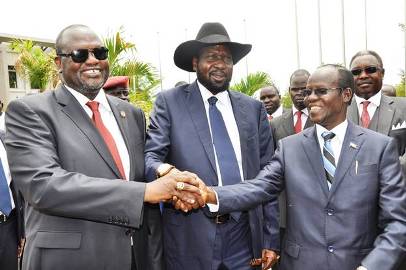SPLM-IO pushes for speedy implementation of peace agreement
May 12, 2016 (JUBA) – South Sudan’s armed opposition – SPLM-IO – under the leadership of the First Vice-President, Riek Machar, said it is important to speed up the implementation of the August 2015 peace agreement in order to compensate for lost time of six months.

The agreement scheduled for three months of pre-transitional period during which the two parties should have prepared and formed a transitional government of national unity (TGoNU) by the end of November last year.
TGoNU should have started implementing the peace agreement 6 months ago.
However, there were delays due to combination of many factors including disagreements on the way forward among the parties, only for the TGoNU to be formed two weeks ago at the end of April.
SPLM-IO stresses the importance of speeding up the process so as to catch up with the initial timetable for the implementation of the deal.
“Our leadership stresses the importance of speeding up the implementation of the Agreement on the Resolution of the Conflict in South Sudan,” Machar’s Press Secretary, James Gatdet Dak, told Sudan Tribune on Thursday.
He said there are major provisions in the peace accord which needed to be tackled soon without which TGoNU cannot move forward faster in implementing the agreement.
“Number of states in the country needs to be resolved. Suspension of the controversial 28 states per the IGAD communiqué is important. The transitional unity government should agree on the number of new states or revert to the 10 states. This is because state governments will not be formed until the matter is resolved,” he said.
Dak added that the SPLM-IO leadership wanted the issue of cantonment areas for the opposition forces in Equatoria and Bahr el Ghazal regions, among others, to be resolved in implementing the security arrangements and restoring peace and stability to the country.
He also added that a transitional national legislative assembly has not been reconstituted in accordance with the peace agreement, adding that the current national parliament continues to operate illegally.
“This was supposed to be done concurrently with the formation of the transitional cabinet,” he said.
The leadership of the SPLM-IO, he said, met on Thursday and reiterated the importance of speeding up the implementation of the deal as signed by the parties so as to address insecurity, economic and humanitarian problems and restore peace, stability and pursue reconciliation among the people in the country.
He said it was thought that the first agenda of the TGoNU’s council of ministers in its two weeks of existence would have included the issues of 28 states, cantonment of forces and fate of the national parliament.
Observers say President Kiir’s faction in the new council of ministers seems to be reluctant to address the matters over the 28 states and areas of cantonment.
Previously, the former government expressed unwillingness to reverse the creation of the 28 states, saying it was the demand of the people.
The government, before formation of the TGoNU, also denied cantonment areas to SPLA-IO forces in the two regions of Equatoria and Bahr el Ghazal, arguing that the opposition faction had no forces in these two regions.
(ST)
